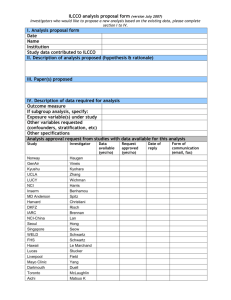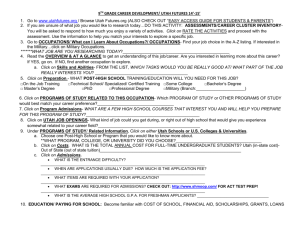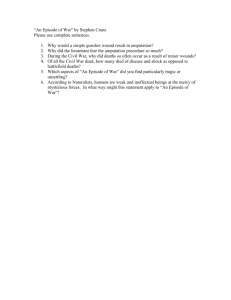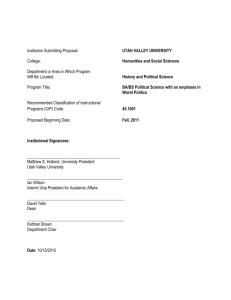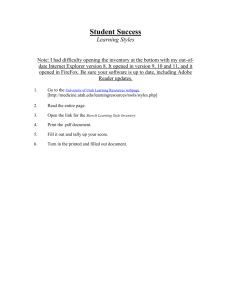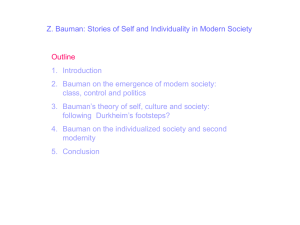Housing Policy and Issues - Department of Family and Consumer
advertisement
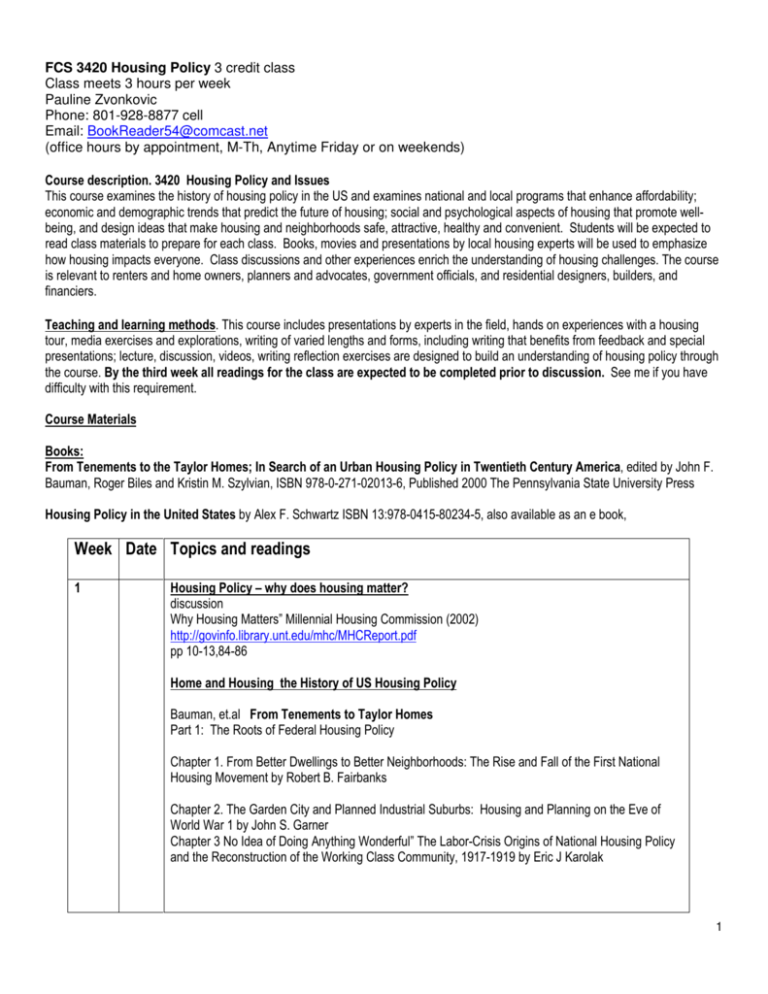
FCS 3420 Housing Policy 3 credit class Class meets 3 hours per week Pauline Zvonkovic Phone: 801-928-8877 cell Email: BookReader54@comcast.net (office hours by appointment, M-Th, Anytime Friday or on weekends) Course description. 3420 Housing Policy and Issues This course examines the history of housing policy in the US and examines national and local programs that enhance affordability; economic and demographic trends that predict the future of housing; social and psychological aspects of housing that promote wellbeing, and design ideas that make housing and neighborhoods safe, attractive, healthy and convenient. Students will be expected to read class materials to prepare for each class. Books, movies and presentations by local housing experts will be used to emphasize how housing impacts everyone. Class discussions and other experiences enrich the understanding of housing challenges. The course is relevant to renters and home owners, planners and advocates, government officials, and residential designers, builders, and financiers. Teaching and learning methods. This course includes presentations by experts in the field, hands on experiences with a housing tour, media exercises and explorations, writing of varied lengths and forms, including writing that benefits from feedback and special presentations; lecture, discussion, videos, writing reflection exercises are designed to build an understanding of housing policy through the course. By the third week all readings for the class are expected to be completed prior to discussion. See me if you have difficulty with this requirement. Course Materials Books: From Tenements to the Taylor Homes; In Search of an Urban Housing Policy in Twentieth Century America, edited by John F. Bauman, Roger Biles and Kristin M. Szylvian, ISBN 978-0-271-02013-6, Published 2000 The Pennsylvania State University Press Housing Policy in the United States by Alex F. Schwartz ISBN 13:978-0415-80234-5, also available as an e book, Week Date Topics and readings 1 Housing Policy – why does housing matter? discussion Why Housing Matters” Millennial Housing Commission (2002) http://govinfo.library.unt.edu/mhc/MHCReport.pdf pp 10-13,84-86 Home and Housing the History of US Housing Policy Bauman, et.al From Tenements to Taylor Homes Part 1: The Roots of Federal Housing Policy Chapter 1. From Better Dwellings to Better Neighborhoods: The Rise and Fall of the First National Housing Movement by Robert B. Fairbanks Chapter 2. The Garden City and Planned Industrial Suburbs: Housing and Planning on the Eve of World War 1 by John S. Garner Chapter 3 No Idea of Doing Anything Wonderful” The Labor-Crisis Origins of National Housing Policy and the Reconstruction of the Working Class Community, 1917-1919 by Eric J Karolak 1 2 Housing Policy and the Beginnings of Suburbia Bauman, et.al Chapter 4. Shaping Housing and Enhancing Consumption: Hoover’s Interwar Housing Policy by Janet Hutchison Chapter 5. The Federal Government and Housing During the Great Depression by Gail Radford Chapter 6. The Federal Housing Program During World War II by Kristin M. Szylvian Paper 1. Ideal home reflection paper, due Class 4 . Class discussion. Prepare a five (5) page paper on your ideal house/home. Where would it be, what size, design, and neighborhood. Provide what it would costs in relationship with your earnings; include an estimate on taxes, insurance, and other maintenance costs. How far will it be from where you work? How long would you expect to live in the house? Provide any specific elements or design features you think are important for your well being. 3 Cities and Suburbs Bauman et. al Federal Housing Policy in Postwar America Film Chapter 7. Public Housing and the Postwar Urban Renaissance 1949-1973 by Roger Biles Chapter 8. The Other “Subsidized Housing” Federal Aid to Suburbanization, 1940 Chapter 11. Planned Destruction: The Interstates and Central City Housing by Raymond A Mohl National Low Income Housing Coalition 2011 Advocates Guide: http://www.nlihc.org/template/page.cfm?id=274, read the following program descriptions • Federal Housing Administration pp 85-86 4 Public Housing Paper 1 DUE Bauman et. al Chapter 9. Why They Built Pruitt-Igoe by Alexander von Hoffman Chapter 10 Choosing Segregation: Federal Housing Policy Between Shelly and Brown by Arnold R. Hirsh Chapter 12. Jimmy Carter, Patricia Roberts Harris and Housing Policy in the Age of Limits by John F. Bauman Film 2 5 Beginnings of Today - Understanding Where We Are Schwartz, Housing Policy in the United States 1. Introduction 2. Trends, Patterns, Problems 3. Housing Finance Guest Speaker 6 Paper 1 Return Affordability in Housing Schwartz, 4. Taxes and Housing 5. The Low-Income Housing Tax Credit Guest Speaker Paper 2 due Class 8 “The most interesting research on housing policy I could find. “ Find a topic you are interested in and dig deeper by finding some respectable academic research on the issue (a journal article, such as one from Housing Policy Debate or Cityscape (www.HUD.GOV) both available on line). Expect to do some searching. Write a five (5) page paper summarizing what you learned but also arguing for why you believe the information should be included in a class discussion on Housing. Plus, provide a one page memo or power point slide presentation (no less than 6 slides) to show how you would share this information with a class (but a presentation is not required). If you need further information on this requirement see me. 7 More on Affordability Schwartz, 6. Public Housing 7. Privately Owned Rental Housing Built with Federal Subsidy 8. Vouchers TEST 1 8 Building Affordable Housing Guest Speakers 9. State and Local Housing Policy and the Nonprofit Sector 10. Housing for People with Special Needs 3 Return Test, Q and A, Return Paper 2 Discussion of Final Paper: Paper/presentation 3: From knowledge to application in housing policy (10 pages written for an academic audience, if solo; longer–but not necessarily double-- if by a team.) “Housing Policy of your choice” 9 See rest of the syllabus for additional information Housing for Special Populations - Homelessness The State of Utah’s 10 Year Plan to End Homelessness http://housingworks.utah.gov/publication_research/documents/2011HomelessReportFinal.pdf www.endhomelessness.org/files/599_file_StateOfUtah.pdf - only scan Million Dollard Murray – Malcolm Gladwell (reading for 2/29) http://www.gladwell.com/2006/2006_02_13_a_murray.html Special Needs Populations Tour the website for National Public Radio’s Housing Series. http://www.npr.org/news/specials/housingfirst/whoneeds/index.html NPR Housing First Series http://www.npr.org/news/specials/housingfirst/narratives/index.html Read the pages on the topics covered in the series. These are: • Women and Children Fleeing Abuse • Recovering Substance Abusers • Ex-Offenders • Youth Leaving Foster care • Homeless People • People with Mental Illness • People with Mental Retardation • People with Physical Disabilities Guest Speaker (possible) 10 Spring break 11 Fair Housing Schwartz 11. Fair Housing and Community Reinvestment 12. Homeownership and Income Integration These are very short articles, approximately 2 pages each.. http://portal.hud.gov/hudportal/HUD?src=/program_offices/fair_housing_equal_opp/FHLaws/yourrights http://portal.hud.gov/hudportal/documents/huddoc?id=DOC_12146.pdf Supportive Housing: the Most Effective and Integrated Housing for People with Mental Disabilities – Judge David L. Center for mental health Law 4 http://www.policyarchive.org/handle/10207/bitstreams/17631.pdf The State of Housing in American in the 21st Century: A Disability perspective, National Council on Disability, January 19, 2010 http://www.ncd.gov/publications/2010/Jan192010 pp 27-34, 89-123 12 Guest Speaker Foreclosure Crisis Episode 418: TOXIE TRANSCRIPT http://www.thisamericanlife.org/radio-archives/episode/418/transcript This American Life: Episode: 355: THE GIANT POOL OF MONEY (acts 1 – 2) Originally aired 05.09.2008 http://www.thisamericanlife.org/radio-archives/episode/355/the-giant-pool-of-money http://www.thisamericanlife.org/radio-archives/episode/355/the-giant-pool-of-money?act=2 Film Students MAY provide a draft or outline of their Final Paper for review, feedback provided by Class 13 13 Sustainability and Housing, the connection. Sustainable housing and communities A Citizen’s Guide to LEED for Neighborhood Development PP 4-16 http://www.nrdc.org/cities/smartgrowth/files/citizens_guide_LEED-ND.pdf Envision Utah’s Wasatch Choice for 2040 http://www.envisionutah.org/Wasatch%20Choices%202040%20Report_Complete.pdf Housing: Affordability Index discussion Go to the Housing and Affordability Transit index http://htaindex.cnt.org/ Place information on where you live/ or a place you wish to live/ into the index. Bring information on what you discovered to class 14 Housing Site Visit (site to be determined) 15 Going Green – what does it mean for today and tomorrow Penny Wise Pound Fuelish CNT March 2010 http://www.cnt.org/repository/pwpf.pdf Recap of class discussions and review. 5 16 Class housing conference day. Presentations & Paper 3. due TEST – Final Course Objectives: -develop an understanding of the importance of housing from psychological, cultural, community, and financial viewpoints -develop critical thinking in the context of societal myths and facts about housing and housing policies -connect individual housing choices to societal consequences -appreciate the ways that housing policies differ across the income/wealth continuum. -understand housing policy challenges across the lifespan -build familiarity with housing policy issues through a series of critical reflections across the semester -become familiar with the major housing policies for affordability, why they are needed, and how well they work - become acquainted with some current housing needs and policies -becoming familiar with web based research sites will enable you to make good consumer or job-related housing decisions for life. Course Objectives specific to Communication/Writing: -understand how housing advocates use research and writing to develop effective public messages about housing policy -develop an ability to speak and/or write critically about housing issues, especially in controversial areas where there are multiple “sides” of an issue (e.g., structural vs. personal causes of homelessness; affordable housing shortages as a function of too little or too much government action). -practice applying housing communication research in your own writing to enable specific audiences (e.g., lay persons, city council members) to understand and/or apply specific housing policy -communicate your understanding of housing policies in multiple formats (e.g., powerpoint, paper, video, oral presentation) - revise your written work, based on feedback from both the professor and peers - receive direct instruction on writing and communication. Evaluation methods. Tests are non-cumulative and cover readings, lecture and presentations. Test format may include short answers and essays. Class attendance is highly recommended to do well on tests and papers. Written assignments are to be typed, submitted in hard copy on time. They can be double sided, 1.5 spacing 15% = Test 1 15% = Test 2 (A take home test may be offered as one or more exam options.) I do not intend to offer make-up exams. 20% = Paper 1 20% = Paper 2. 25% = Final Paper and presentation- 10 pages to an academic audience plus your choice of a media project to a real world audience). 5% = class participation and field trip Grading scale. Papers are graded on a 1-10 scale, proportional to 100 pts. Tests are on the 0-100 scale (Note: 93% = 9.3) 93% = A 90-92.9 = A87-89.9 = B+ 83-86.9 = B 80-82.9 = B77-79.9 = C+ 73-76.9 = C 70-72.9 = C67-69.9 = D+ 63-66.9 = D 60-62.9 = D- < 60 6 Late/Missing policy for all papers & assignments: Late papers will be accepted but lose 10% each late day. Papers over 7 days late will not be accepted. Make-up tests are generally not given unless a written Doctor’s note is provided and notification on the absence is given ahead of time. Paper 1. “Your Ideal Home” Paper 2. “The most interesting research on housing policy I could find. “ Find a topic you are interested in and dig deeper by finding some respectable academic research on the issue (a journal article, such as one from Housing Policy Debate or Cityscape, both available on line). Expect to do some searching. I want a 3 page paper summarizing what you learned but also arguing for why you believe the information should be included in a class discussion on Housing. Plus, provide a one page memo or slides (no less than 6) to show how you would share this information with a class (but a presentation is not required). Paper/presentation 3: From knowledge to application in housing policy (10 pages written for an academic audience, if solo; longer–but not necessarily double-- if by a team.) “Housing Policy of your choice” Pick a housing policy of your choice and find at least three (3) good scholarly research sources on it (3 articles or chapters; if you are not sure if they are good enough, check with me. Do NOT use Wikipedia. Good sources include: Joint Center for Housing Studies of Harvard University; HUD PD&R Cityscape; Housing Research.Org; Policy Debate, Urban Studies, City and Community, Journal of the American Planning Association, among other professional peer reviewed publications. (Ask me if you are in doubt about the quality of resources). Describe the need for the policy and its pros and cons. Provide some original research on this (research can include looking up census data on the web, or interviewing people living in this type of housing or asking people whether they would consider this type of housing, or taking pictures to evaluate design issues, or providing a more extensive review of scholarly literature, or conducting a newspaper article analysis of the topic, for example). The format of the paper and presentation can take many forms, but should emphasize using research for some useful purpose. When you decide upon the useful purpose, you can think about communicating to at least two audiences. One audience is the class and a faculty member. You will want to demonstrate that you have achieved breadth and depth of knowledge about at least one housing policy, that you have considered pros and cons, and that you have critically evaluated the quality of the research behind the policy. The second audience is one that could use your research for decision making, but who might have different standards for persuasiveness and evaluation. For example your report could include an application section that -is a television script of a debate between advocates of two different positions on a controversial policy. -is a briefing memo to the Mayor, City Council, a Senator or Congressman or the Governor about a particular policy or housing need (expiring affordable housing programs; housing trust fund appropriations; siting of controversial land uses such as multifamily housing developments.) -is an educational module for this class on a new subject or an old subject covered in a different way -is an educational module for non-traditional students (immigrants, single head of households, senior citizens, home builders). -a PowerPoint to show community councils how affordable housing, visitable housing, or more compact housing can become acceptable to a community. -an editorial or opinion paper written for the newspaper, backed up by a longer analysis. -a letter to a senior citizen group about the pros and cons of aging in place and reverse mortgages. -a study proposal of housing issues you hope to have funded by a research organization. Working in teams – You may develop your final paper and presentation in a team. If you do so, a portion of the final presentation must be made by all participants. The paper will need to reflect the work of all participants as well. Course Policies 7 1. ADA. The University of Utah seeks to provide equal access to its programs, services and activities for people with disabilities. If you will need accommodations in the class, reasonable prior notice needs to be given to the Center for Disability Services, 162 Union Building, 581-5020 (V/TDD). CDS will work with you and the instructor to make arrangements for accommodations. Please contact me within the first two weeks of the semester to alert me to ADA needs. 2. Missing classes. If you miss a class, it is your responsibility to find out what material was covered. I will not be posting my lecture notes on a web site nor will I make copies of my notes for students. You are welcome to meet with me during my office hours or at another pre-arranged time to talk about what was covered in class on a day you missed. Alternatively, if you know that you will miss a class, you might make arrangements to get a copy of another student’s notes. 3. Personal beliefs. It is the student’s obligation, before the last day to drop courses without penalty, when course requirements conflict with the student’s sincerely-held core beliefs. If there is such a conflict, the student should consider dropping the class. A student who finds this solution impractical may request a context accommodation from the instructor. This request must be made to the instructor in writing, and the student must deliver a copy of the request to the office of the department chair. The student’s request must articulate the burden the requirement would place on the student’s beliefs. The instructor will respond to the request in writing within two school days of receiving it. Please see: http://www.admin.utah.edu/facdev/accommodations-policy.pdf for further details. 4. Plagiarism. The University of Utah Student Handbook provides the following definition of plagiarism: “Plagiarism” means the intentional unacknowledged use or incorporation of any other person's work in, or as a basis for, one's own work offered for academic consideration or credit or for public presentation. Plagiarism includes, but is not limited to, representing as one's own, without attribution, any other individual’s words, phrasing, ideas, sequence of ideas, information or any other mode or content of expression. Any plagiarized assignment in class will automatically receive a score of zero. 5. Final papers & tests. Students’ tests and papers will be kept for two months after the end of the semester in the instructor’s office. After that time, they will be destroyed. 8

